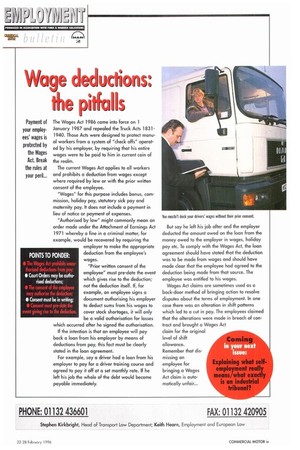Wage deductions: the pitfalls
Page 54

If you've noticed an error in this article please click here to report it so we can fix it.
Payment of The Wages Act 1986 came into force on I your employJanuary 1987 and repealed the Truck Acts 1831ees wages is protected by the Wages wages were to be paid to him in current coin of al workers from a system of "check offs" operated by his employer, by requiring that his entire 1940. Those Acts were designed to protect manu Act. Break the realm.
the rules at The current Wages Act applies to all workers and prohibits a deduction from wages except your peril... where required by law or with the prior written
consent of the employee.
"Wages" for this purpose includes bonus, cornmission, holiday pay, statutory sick pay and maternity pay. It does not include a payment in lieu of notice or payment of expenses.
"Authorised by law" might commonly mean an order made under the Attachment of Earnings Act 1971 whereby a fine in a criminal matter, for example, would be recovered by requiring the employer to make the appropriate deduction from the employee's wages.
"Prior written consent of the employee" must pre-date the event which gives rise to the deduction; not the deduction itself, if, for example, an employee signs a document authorising his employer to deduct sums from his wages to cover stock shortages, it will only be a valid authorisation for losses which occurred after he signed the authorisation.
If the intention is that an employee will pay back a loan from his employer by means of deductions from pay, this fact must be clearly stated in the loan agreement.
For example, say a driver had a loan from his employer to pay for a driver training course and agreed to pay it off at a set monthly rate. If he left his job the whole of the debt would become payable immediately. But say he left his job after and the employer deducted the amount owed on the loan from the money owed to the employer in wages, holiday pay etc To comply with the Wages Act, the loan agreement should have stated that the deduction was to be made from wages and should have made clear that the employee had agreed to the deduction being made from that source. The employee was entitled to his wages.
Wages Act claims are sometimes used as a back-door method of bringing action to resolve disputes about the terms of employment. In one case there was an alteration in shift patterns which led to a cut in pay. The employees claimed that the alterations were made in breach of contract and brought a Wages Act claim for the original
level of shift allowance. Remember that dismissing an employee for bringing a Wages Act claim is automatically unfair...




































































































